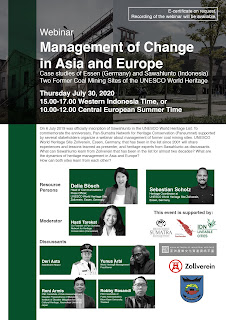MY TWENTY TWENTY

International Symposium on Water and Culture, Monday, February 3rd, 2020, National Graduate Institute for Policy Studies (GRIPS), Tokyo, Japan, (Organized by High-level Experts and Leaders Panel on Water and Disasters (HELP), National Graduate Institute for Policy Studies (GRIPS), Ministry of Land, Infrastructure, Transport, and Tourism of Japan (MLIT), UN Center for Regional Development (UNCRD/UNDESA), and ICOMOS Netherlands) Water nurtures a unique and diverse culture of a society that becomes a solid foundation of sustainable development of regions. Innovative paths for regional development can be found by looking at people’s lives and livelihood through a water lens. Leading experts on water and culture will present cases of rich water culture and their impact on regional society and economy. Good practices and lessons on water-related regional development will be shared from both historical and modern cases. The panelists discussed how the issue of water and culture can ...





